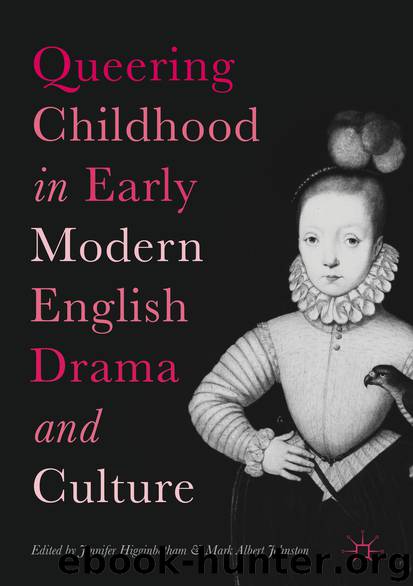Queering Childhood in Early Modern English Drama and Culture by Jennifer Higginbotham & Mark Albert Johnston

Author:Jennifer Higginbotham & Mark Albert Johnston
Language: eng
Format: epub
Publisher: Springer International Publishing, Cham
Aaron attributes the boys ’ lechery to heredity or blood (via the metaphor of the card one is dealt) and their bloody minds or barbarity to his own tutelage (using the example of a dog trained to fight). Ironically, he pits blood against violence, nature against nurture, thereby rather radically suggesting that barbarity, like civility (and barbering ), must be learned and practiced rather than being innate.38 The ethical concern that underpins Aaron’s depiction of his mastery of the boys builds upon a view, familiar from early modern conduct manuals and other didactic discourses, promoting “the image of children as empty vessels, waiting to be filled and ‘seasoned’ with the words and ideas taught to them by adults” (84).39 Modifying the vehicle of that metaphor, Titus Andronicus repeatedly deploys imagery likening children to wild plants and animals in need of pruning, trimming, and training —violent interventions more akin to barber -surgical lopping and hewing than to vessel filling per se.40 Subsequently riffing on his role as educator by claiming that he “trained ” Quintus and Martius to their demise (as if they were vines ) just as he trained Tamora’s boys (as if they were dogs ), Aaron’s confession explicitly credits tutelage —what the play cleverly construes as barbaric internship, rather than the lack of a civilizing , Christian humanist education —with the acquisition of a barbarically “bloody mind.”
Aaron’s declaration further sets the discursive stage for his subsequent assertions, which build on the popular early modern misconception that “barber ” and “barbarian ” share a common etymological ancestry. The Latin barba, or beard, provides the root for the English word barber , but the former term was also assumed to be the origin for the words barbarian , barbarity , and barbarism , whose common root is in fact the Latin barbar, meaning strange or foreign —an entirely distinct word and concept. Although barber and barbarian are thus not cognate terms, Shakespeare will again capitalize on their imaginative conflation for The Merchant of Venice , which shares with Titus Andronicus a profound interest in tracing the roots of prejudice, rivalry, vengeance, and violence in kinship and contractual bonds , including mastery and servitude .41 Nominally, barbers were associated in the early modern imagination with an array of queer and unsavory activities as diverse as foreign babbling, idolatry, and sorcery,42 along with all sorts of corporeal cutting, including clipping and shaving, exsanguination , amputation, circumcision, castration, dissection, vivisection, anatomization, flaying, and so forth. Polluted by their close proximity to bodily filth like bad blood , excremental waste, and diseased flesh, barbers were often accused of cruelty, vulgarity, ignorance , greed, vanity, lasciviousness, mercilessness—vicious qualities that critics and scholars of Shakespeare ’s plays have long employed to characterize both Titus Andronicus and its central protagonists. As fictional characters, barbers thus conjured myriad associations for early modern English audiences that are difficult for modern audiences or readers to fully grasp; even the discourse of barbering —which carried imputations of both secret knowledge and
Download
This site does not store any files on its server. We only index and link to content provided by other sites. Please contact the content providers to delete copyright contents if any and email us, we'll remove relevant links or contents immediately.
Call Me by Your Name by André Aciman(20517)
Ready Player One by Cline Ernest(14675)
How to Be a Bawse: A Guide to Conquering Life by Lilly Singh(7486)
Wiseguy by Nicholas Pileggi(5786)
The Kite Runner by Khaled Hosseini(5179)
On Writing A Memoir of the Craft by Stephen King(4944)
Audition by Ryu Murakami(4930)
The Crown by Robert Lacey(4817)
Call me by your name by Andre Aciman(4684)
Gerald's Game by Stephen King(4654)
Harry Potter and the Cursed Child: The Journey by Harry Potter Theatrical Productions(4507)
Dialogue by Robert McKee(4404)
The Perils of Being Moderately Famous by Soha Ali Khan(4220)
Dynamic Alignment Through Imagery by Eric Franklin(4217)
Apollo 8 by Jeffrey Kluger(3709)
The Inner Game of Tennis by W. Timothy Gallwey(3687)
Seriously... I'm Kidding by Ellen DeGeneres(3634)
How to be Champion: My Autobiography by Sarah Millican(3593)
Darker by E L James(3516)
